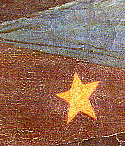

This part is mostly limericks and other forms of poetry, plus a few anecdotes. I don't hate any of them, so perhaps this will actually be brief.
Ralph Barton's Twinkle, Twinkle, Little Star is amusing becuase of the massive equation followed by the simple "Oh... now I see". However, the equation doesn't seem to make sense. I have only the rudiments of mathematics, but I'm sure that an expression can never end with "+".
I must reproduce To Think That Two and Two Are Four to show why I like it.
- To think that two and two are fourIt's the brevity and the totally unrelated ideas.
And neither five nor three,
The heart of man has long been sore
And long 'tis like to be.
Oh, dear - I am puzzled by a symbol in John Atherton's Threes (To Be Sung By Neils Bohr). It looks like this  (except round) and the fifth stanza makes little sense without it.
(except round) and the fifth stanza makes little sense without it.
Plane Geometry by Emma Rounds is a very well-written ripoff of Jabberwocky. Very well written indeed. There's only one error of meter in all of the seven stanzas, which is most impressive.
C Stanley Olgivy's definition of "for all practical purposes" delights me so much that I've already repeated it to someone. He describes repeatedly halving the distance between a line of girls and a line of boys: "Theoretically, the boys would never reach the girls..."
Who meddled with Dr William Whewell's unintentionally rhyming sentence, "Hence no force...", to turn it into verse? It's funnier in the original prose.
And of course Babbage has every right to correct Tennyson's statement:
Every moment dies a man,It's just a pity that no greater accuracy than 11/6 can be used in that second line.
Every moment one is born.
Finally, an anonymous limerick, punning on "too few": are two and two really only four? I like the word-play there.
So I have finally finished the blasted book and can get back to gorgeous Gribbin and the quintessential quantum. Oh, dear. I fear these finnicky fairytales are making me far too fanciful.